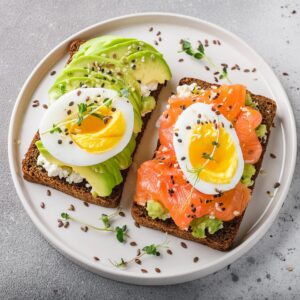Did you know that the secret to luscious, healthy hair could be hiding in your pantry or supplement bottle? Vitamins and minerals play a crucial role in maintaining the overall health and vitality of your hair. From promoting hair growth to preventing hair loss and even improving its shine and texture, these essential nutrients provide the necessary support for strong and beautiful locks.
In this article, we will explore the role of vitamins and minerals in hair health. We’ll dive into the science behind how specific nutrients, such as biotin, vitamin E, and zinc, nourish and protect your hair follicles. Whether you’re struggling with hair loss, thinning hair, or simply want to enhance your hair’s natural beauty, understanding the connection between nutrition and hair health is key.
The Importance of Vitamins and Minerals for Overall Health
Maintaining a balanced diet rich in essential vitamins and minerals is not only beneficial for your overall health but also plays a significant role in the health of your hair. A deficiency in key nutrients can lead to hair problems such as hair loss, dullness, and slow growth. Multivitamins and minerals act as building blocks for healthy hair, providing the necessary support for strong and vibrant locks.

By ensuring you consume a variety of nutrient-rich foods or supplements, you can help fortify your hair from within. Vitamins and minerals work synergistically to nourish your hair follicles, strengthen the hair shaft, and improve the overall quality of your hair. Incorporating a well-rounded diet that includes a spectrum of nutrients is essential for promoting optimal hair health.
In addition to external hair care routines, paying attention to your nutritional intake is crucial for achieving the hair of your dreams. Vitamins and minerals not only contribute to the appearance of your hair but also play a role in maintaining a healthy scalp, which is vital for supporting hair growth and preventing issues such as dandruff and inflammation.
Common Vitamins and Minerals that Promote Hair Health
When it comes to enhancing the health and appearance of your hair, certain vitamins and minerals stand out for their remarkable benefits. From supporting hair growth to preventing hair loss and improving hair texture, incorporating these nutrients into your daily regimen can make a significant difference in the vitality of your locks. Let’s explore some key vitamins and minerals known for their positive effects on hair health.

Vitamin A: Benefits and Sources for Hair Health
Vitamin A is an essential nutrient that plays a crucial role in promoting healthy hair growth and development. This vitamin aids in the production of sebum, a natural oil that moisturizes the scalp and keeps hair follicles healthy. Incorporating vitamin A-rich foods such as sweet potatoes, carrots, and spinach into your diet can help maintain proper levels of this nutrient for optimal hair health.
In addition to promoting hair growth, vitamin A also contributes to the overall strength and shine of your hair. However, it’s important to consume vitamin A in moderation, as excessive intake can lead to adverse effects. By ensuring you meet the recommended daily intake of vitamin A through a balanced diet, you can support the health and vitality of your hair.
Vitamin B Complex: Role in Hair Growth and Maintenance
The B-complex vitamins, including Biotin (B7), Niacin (B3), and Folate (B9), are essential for promoting healthy hair growth and maintenance. Biotin, in particular, is well-known for its role in strengthening hair strands and preventing breakage. This vitamin also supports the production of keratin, a protein that makes up the structure of hair, promoting overall hair health and resilience.

Niacin and Folate are equally important for hair health, as they help improve blood circulation to the scalp and support cell division, which is essential for hair growth. Including foods rich in B-complex vitamins, such as eggs, nuts, and leafy greens, in your diet can help ensure your hair receives the nourishment it needs to thrive.
Vitamin D: Connection Between Deficiency and Hair Loss
Vitamin D deficiency has been linked to hair loss and various hair disorders, making it a crucial nutrient for maintaining a healthy scalp and hair follicles. This vitamin plays a role in the hair growth cycle and helps regulate the genes involved in hair follicle function. Exposure to sunlight is a natural way to increase vitamin D levels, while incorporating fortified foods and supplements can also help meet your daily requirements.
Ensuring you have sufficient vitamin D levels can promote hair growth, reduce hair shedding, and support the overall health of your hair. By including vitamin D-rich sources like fatty fish, fortified dairy products, and mushrooms in your diet, you can help maintain strong and vibrant hair.
Vitamin C: Antioxidant Properties and Its Impact on Hair
Vitamin C is renowned for its antioxidant properties, which help combat oxidative stress and protect the hair follicles from damage. This vitamin plays a vital role in collagen production, a protein that supports hair structure and growth. By incorporating vitamin C-rich foods like citrus fruits, bell peppers, and strawberries into your diet, you can promote stronger, healthier hair from the inside out.

In addition to its antioxidant benefits, vitamin C aids in iron absorption, another essential nutrient for healthy hair. Ensuring you have an adequate intake of vitamin C can help maximize the benefits of other nutrients and support overall hair health. Including vitamin C as part of your daily nutrition can contribute to vibrant and resilient hair.
Iron: Essential Mineral for Healthy Hair
Iron is an essential mineral that plays a critical role in the oxygenation of hair follicles and the growth of strong, healthy hair. Anemia, a condition associated with hair loss and reduced hair quality, can be caused by iron deficiency. Incorporating iron-rich foods such as lean meats, lentils, and dark leafy greens can help prevent iron deficiency and support optimal hair growth.
By ensuring you have adequate iron levels in your body, you can promote healthy circulation to the scalp, which is essential for delivering nutrients to the hair follicles. Including iron as part of your diet can help maintain the strength and vitality of your hair, preventing issues such as thinning and breakage.
Zinc: Promoting Hair Growth and Preventing Hair Loss
Zinc is a vital mineral that supports hair growth and helps prevent hair loss by promoting cell reproduction, tissue growth, and repair. This mineral plays a role in maintaining the oil glands around hair follicles, which in turn keeps the scalp healthy and nourished. Including zinc-rich foods like oysters, seeds, and nuts in your diet can help ensure your hair receives the necessary support for growth and maintenance.
In addition to its role in hair growth, zinc also contributes to the overall health of the scalp, helping to prevent conditions such as dandruff and inflammation. By incorporating zinc into your daily nutrition, you can support strong, resilient hair and maintain a healthy scalp environment conducive to optimal hair growth.

Conclusion
In conclusion, the role of vitamins and minerals in hair health cannot be overstated. From supporting hair growth and preventing hair loss to improving hair texture and shine, these essential nutrients are key players in maintaining strong and vibrant locks. By incorporating a variety of vitamin and mineral-rich foods into your diet or supplementing as needed, you can provide your hair with the necessary building blocks for optimal health.
Remember, achieving beautiful, healthy hair is not just about external care but also about nourishing your hair from within. By understanding the benefits of vitamins and minerals such as Vitamin A, B-complex vitamins, Vitamin C, Vitamin D, Iron, and Zinc, you can take proactive steps towards enhancing the health and appearance of your hair. So, give your hair the attention it deserves and unlock the secrets to luxurious, luscious locks through the power of nutrition.


